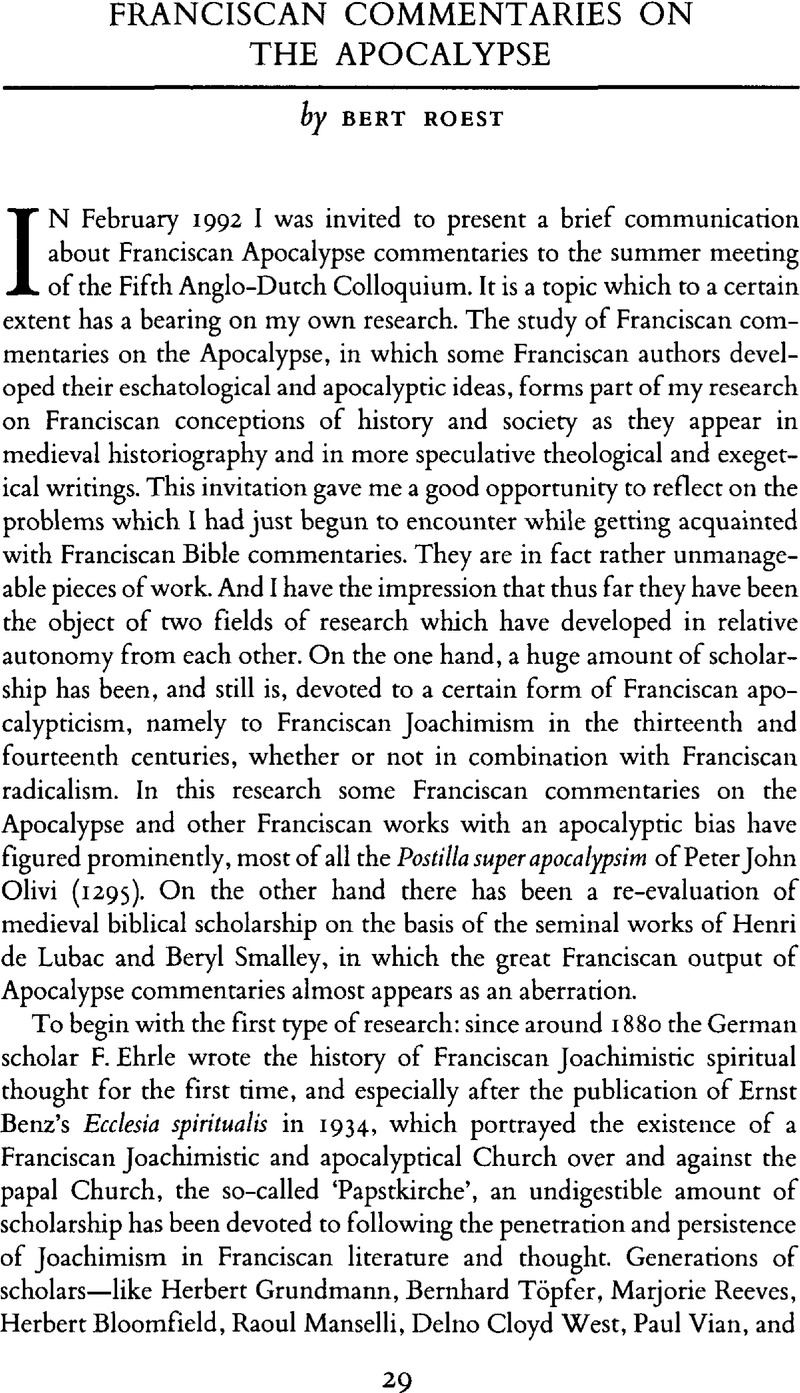No CrossRef data available.
Article contents
Franciscan Commentaries on the Apocalypse
Published online by Cambridge University Press: 17 February 2016
Abstract

- Type
- Part I: The Apocalypse
- Information
- Copyright
- Copyright © Ecclesiastical History Society 1994
References
1 The following works offer the most authoritative introductions to this scholarly field: Benz, E., Ecclesia spirituals. Kirchenidee und Geschichtstheologie der Franziskanischen Reformation (Stuttgart, 1934Google Scholar); Bloomfield, M. W., ‘Joachim of Flora: A Critical Survey of his Canon, Teachings, Sources, Biography, and Influence’, Traditio, 13 (1957), pp. 249–31Google Scholar i; Burr, D., The Persecution of Peter Olivi, Transactions of the American Philosophical Society, New Series, 66, 5 (Philadelphia, 1976)Google Scholar; McGinn, B., ed., Apocalyptic Spirituality. Treatise and Letters of Lactantius, Adso of Montier-en-Des, Joachim of Fiore, the Franciscan Spirituals, Savonarola (New York—Toronto, 1979Google Scholar); Grundmann, H., Studien über Joachim von Fiore (Darmstadt, 1975)Google Scholar; Lee, H., Reeves, M., Silano, G., eds., Western Mediterranean Prophecy: The School of Joachim of Fiore and the Fourteenth-Century Breviloauium (Toronto, 1989)Google Scholar; Lubac, H. de , La posterite spiriluelle de Joachim de Fiore, 1 (Paris, 1979)Google Scholar; Manselli, R., La ‘Lectura super Apocalypsim’di Pietro di Giovanni Olivi (Rome, 1955)Google Scholar; Reeves, M., Joachim of Fiore and the Prophetic Future (London, 1976)Google Scholar; Schlageter, J., ‘Apokalypt-isches Denken bei Petrus Johannes Olivi. Versuch einer fundamenraltheologischen Wertung’, Wissenschaft und Weisheit, 50 (1987), pp. 13–27Google Scholar; West, D. W., ed., Joachim of Fiore in Christian Thought. Essays on the Influence of the Calahrian Prophet, 2 vols (New York, 1975)Google Scholar.
2 Sec especially David Burr, Olivi and Franciscan Poverty (Philadelphia, 1989), pp. 18–24.
3 Ratzinger, J. , Die Geschichtstheologie des heiligen Bonaventura (München-Zürich. 1959Google Scholar); McGinn, B., The significance of Bonaventure’s theology of history’. Celebrating the Medieval Heritage. A Colloquy on the Thought of Aquinas and Bònaventure, The Journal oj Religion. 58 (1978) Supplement, pp. 64—81Google Scholar.
4 For this scholarly field see especially: Kamlah, W., Apokalypse und Geschichtstheologie. Die mittelalterliche Auslegung der Apokalypse vor Joachim von Fiore (Berlin, 1935)Google Scholar; Lourdaux, W. and Ver-helst, D., eds, The Bible and Medieval Culture, Mediaevalia Lovaniensia, Series I, Studia VII (Louvain, 1979Google Scholar); Lubac, H. de, Exégése ntedievale. Les quatre sens de I’Ecriture, Secondc Parti, I (Paris, 1961)Google Scholar; Riché, P. and Lobrichon, G., eds, Le moyen age et la Bible (Paris, 1984)Google Scholar. See also: Stegmüller, F., Repertorium Biblicum Medii Aevi (Madrid, 1940—80Google Scholar).
5 Kilwardby, Robert, Quaestiones in Librum Pritnunt Sententiarum, ed. Schneider, J. (München, 1986)Google Scholar. See esp. Q. 7, pp. 18ff.
6 Rogeri Bacon Opus Minus, ed. J. S. Brewer (London, 1859), pp. 326–7. With regard to Roger Bacon’s criticism of Albert the Great the editor’s marginal glosses are misleading.
7 Verger, J., ‘L’exégése de l’université’, Le moyen âge et la Bible, pp. 201–32Google Scholar.
8 Ibid., p. 216.
9 Alexander Minorita Expositio in Apocalypsim, ed. Wachtel, A., MGH, Quellen zur Geistesgeschichte des Mittelalters, I (Weimar, 1955)Google Scholar.
10 As a matter of fact, there is sonic disagreement among scholars as to whether or not Olivi’s outlook was predominantly Joachimistic. Manselli agreed that Olivi was influenced by Joachim, but he saw a fundamental difference between Olivi’s christoccntric view of history and the speculations of Joachim. However, Reeves emphasizes Olivi’s overall debt to Joachim’s patterns and figures. See: Manselli, , Lectura, pp. 165 and 190Google Scholar; idem, , ‘La Tcrza Eta. “Babylon” e l’Antichristo Mistico (a proposito di Pietro di Giovani Olivi)’, Bulletino dell’hliluto Storico Italians e Archivio Mnratoriano, 82 (1970), pp. 47—79Google Scholar; Lee, , Reeves, , and Silano, , Breviloquium, pp. 19—26Google Scholar.
11 See esp.: Manselli, R., La religiosità d’Arnaldo di Vilanova (Rome, 1951)Google Scholar; Bignami-Odier, J., ‘Jean de Roquetaillade (de Rupescissa)’, Histoire littéraire de la France, 41 (1981), pp. 75–240Google Scholar; Lee, , Reeves, , and Silano, , Breviloquinm, pp. 27—88Google Scholar.
12 The Apocalypse commentary of Vital du Four was printed repeatedly, under the names of Alcxandet of Hales and Bonavcntura. See Halensis, Alexander, Expositio in Apocalypsim, ed. Haye, Johannes de la (Paris, 1647Google Scholar); Supplementum Operum omnium S. Bonaventurae, II. 5, ed. Benoit Bonelli (Trente, 1773), Cols 5–1035. For the manuscripts of the commentary of William of Meliton, see Stegmuller, , Repertorium Biblicum, II, nos. 418–28; IX, nos. 2960 and 2964.Google Scholar For the commentary of Russel, John, see Smalley, Beryl, Russel, John O.F.M.’, Rechercltes de Theologie Ancienne et Medie’vale, 23 (1956), pp. 277—320Google Scholar. John Russel sometimes cited Joachim of Fiore, but he did not adopt any of Joachim’s patterns, concordances, or divisions.
13 Good scholarly editions of these works are lacking. The following passages on the commentaries of Aureoli and Lyra are based on two outdated printings, namely: Fr. Petro Aureoli Ord. Min. Compendium Sensus Litteralis Tortus Divinae Scripturae, ed. Ph. Seeboeck (Quaracchi, 1896); Biblia Sacra cum Glossa Ordinaria et Postilla Litteralis Nicolai de Lyra (Antwerpen, 1617), cols 1457–1704. David Burr will no doubt provide us with a more complete picture of this exegetical tradition in his forthcoming book, Olivi’s Peaceable Kingdom: A Reading of the Apocalypse Commentary.
14 Nicholas of Lyra, Postilla Litteralis, col. 1662.




